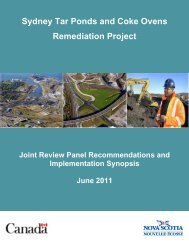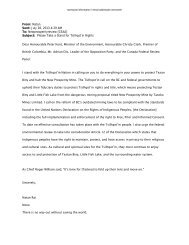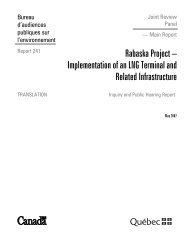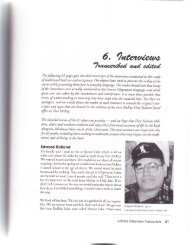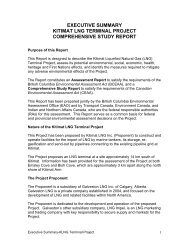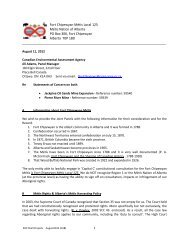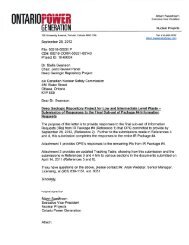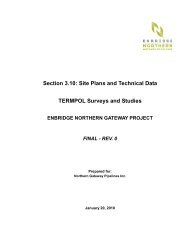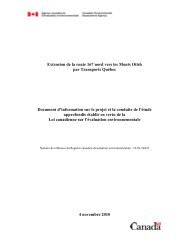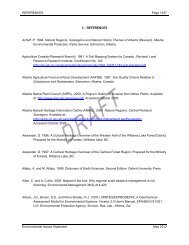SUBMISSIONS OF THE ATHABASCA CHIPEWYAN FIRST NATION ...
SUBMISSIONS OF THE ATHABASCA CHIPEWYAN FIRST NATION ...
SUBMISSIONS OF THE ATHABASCA CHIPEWYAN FIRST NATION ...
You also want an ePaper? Increase the reach of your titles
YUMPU automatically turns print PDFs into web optimized ePapers that Google loves.
Page 3 April 28, 2009<br />
C. ROLE <strong>OF</strong> <strong>THE</strong> FEDERAL GOVERNMENT<br />
It is no secret that there are large resource deposits contained within our<br />
Traditional Lands, particularly deposits of bitumen. As noted above, development<br />
of the oil sands alone, as well as together with other development, has adversely<br />
affected and infringed our section 35 rights. We have made this clear to the<br />
federal government for years. We are deeply concerned that the federal<br />
government appears to be taking a backseat in respect of taking steps to ensure<br />
that such development is done in such a way as to minimize potential impacts on<br />
our rights, our health and on the environment.<br />
While we recognize that the federal government has overlapping jurisdiction with<br />
Alberta in respect of regulating development, in our view that is no reason for the<br />
federal government to essentially cede its role to Alberta. We note, in particular,<br />
that the federal government has both an historic and continuing legal obligation to<br />
take steps to ensure that our rights are protected.<br />
We see the diminishing federal role play our in various ways. There is an<br />
inconsistent federal role in environmental assessments – on some major projects<br />
the federal government establishes joint review panels, while on others the federal<br />
government plays no role at all. We also see the federal government taking a very<br />
narrow view of its constitutional obligations to consult.<br />
D. WHAT CAN <strong>THE</strong> FEDERAL GOVERNMENT DO TO ENSURE<br />
PROTECTION <strong>OF</strong> OUR SECTION 35 RIGHTS?<br />
(a) Opportunities and Legal Obligations<br />
The Crown, federal and provincial, has a legal and constitutional obligation to<br />
consult with First Nations and to seek to accommodate our section 35 rights. In<br />
our view, such obligations present both a challenge and an opportunity for us to<br />
work together. Our objective is to ensure that there is a proper balance between<br />
the maintenance of the conditions necessary for the exercise of our rights and<br />
sustainable development. However, it is our strong view that development cannot<br />
continue at its current pace without destroying what is left of our rights and<br />
without ever more negative consequences to the environment.<br />
Legal cases decided over the last several years, particularly the decision of the<br />
Supreme Court of Canada in the Mikisew Cree case, make it clear that our<br />
concerns about process (such as in respect of the carrying out of consultation, the<br />
carrying out of regulatory review processes) must be accommodated. That<br />
obligation is quite apart from any legal obligation to seriously consider and<br />
accommodate our concerns about the potential impacts of development on our<br />
section 35 rights. The Mikisew Cree case makes it clear that if the process by<br />
3393259.1



